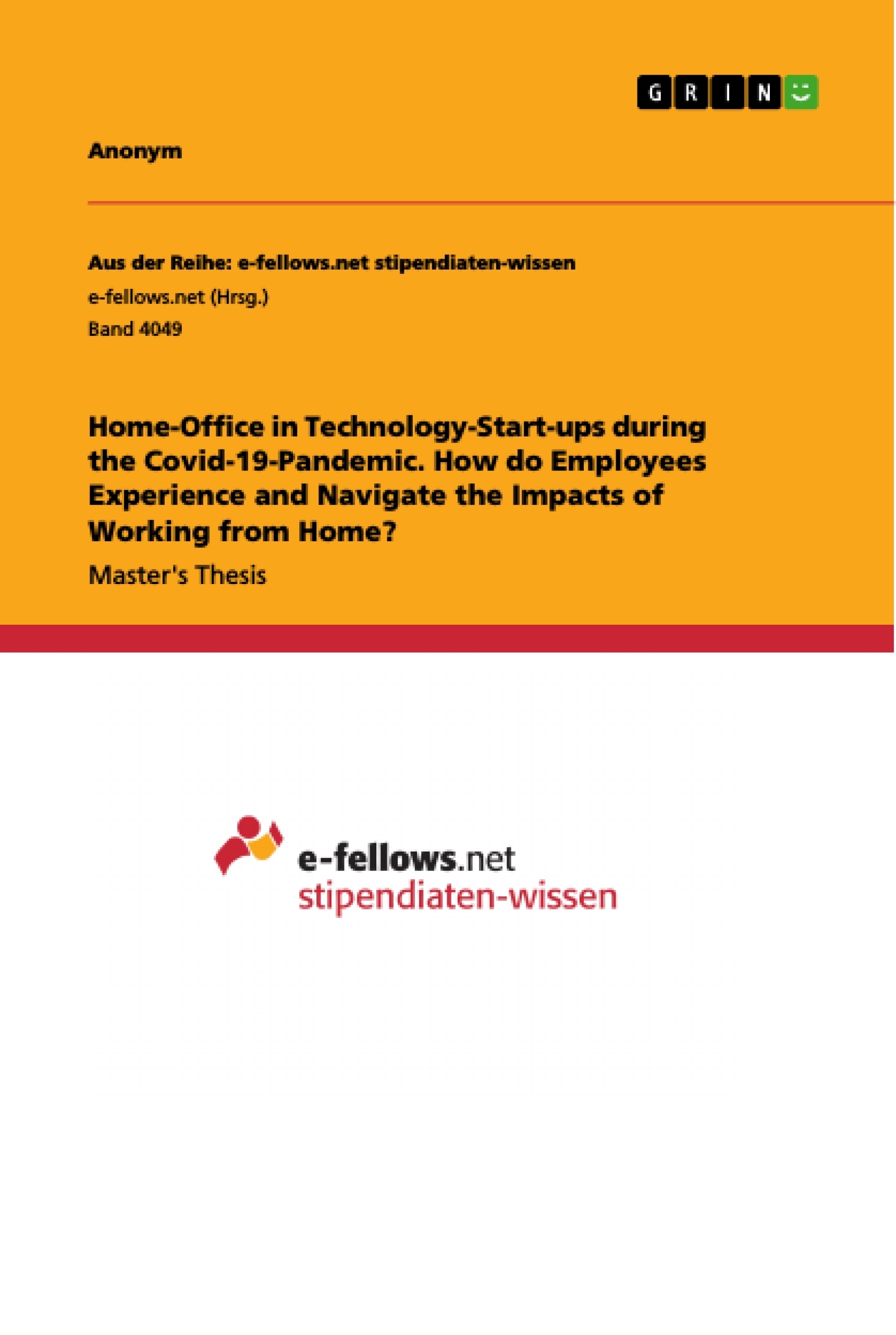This studys purpose is to understand how technology-start-up employees in the start-up hubs London and Berlin perceive the impacts of homeworking and what strategies they apply to navigate emerged challenges associated with losing co-location with colleagues.
A social identity perspective is adopted to explore how employees perceive the dynamic homeworking experience, highlighting the interrelation between effects on individual and collective instances. A total of 18 qualitative interviews were conducted and analysed using thematic analysis. The results show that the experience of harmonising work and private life under one roof can be a critical balancing act and impacts the usual experience of working in a start-up, characterised by close social interactions and organisational identification. Consequently, impacts on social processes essential for the survival of start-ups were found to follow the loss of co-location.
The sudden shift to homeworking by companies worldwide due to the COVID-19 pandemic, sparks intense research in organisational psychology on employee consequences. While literature focuses on firms with sufficient resources to initiate navigational strategies, firms with limited resources are often neglected. Combined with the likelihood that pre-existing homeworking trends will accelerate, it is valuable to examine the perceptions of employees in technology-start-ups which have limited resources to succeed, and whose success is driven by members’ expertise through close and frequent interactions.
Inhaltsverzeichnis (Table of Contents)
- 1. Introduction
- 2. Literature Review
- 2.1 Working from Home in the Context of a Global Pandemic
- 2.1.1 Work-Life Balance or Work-Life Conflict?
- 2.1.2 Virtual Interaction and Teamwork
- 2.2 Applying a Social Identity Approach
- 2.3 Research Objective
- 2.1 Working from Home in the Context of a Global Pandemic
- 3. Methodology
- 3.1 Research Design
- 3.2 Research Context
- 3.3 Data Collection
- 3.4 Method of Analysis
- 3.5 Reflections
- 4. Findings
- 4.1 Impacts of Homeworking
- 4.1.1 Experiencing Work-life Balance in Technology-Start-ups
- 4.1.2 Being a Start-up Employee
- 4.1.3 The Importance of Social Interactions for Learning and Development
- 4.1.4 The Benefits of Teamwork for Start-up Employees
- 4.2 Navigation Strategies
- 4.3 Bringing it Together
- 4.1 Impacts of Homeworking
- 5. Discussion and Concluding Remarks
- 5.1 Theoretical Implications
- 5.2 Practical Implications
- 5.3 Limitations and Future Research
Zielsetzung und Themenschwerpunkte (Objectives and Key Themes)
This dissertation aims to explore the experiences and strategies of technology-start-up employees working from home, focusing on how they navigate the challenges of losing co-location with colleagues. It examines the impact of remote work on individual and collective instances, applying a social identity perspective to understand how employees perceive this dynamic experience.
- The impact of homeworking on work-life balance and work-life conflict in technology-start-ups.
- The role of social interactions in learning and development for start-up employees.
- The impact of homeworking on team dynamics and collaboration in technology-start-ups.
- Navigation strategies employed by start-up employees to manage the challenges of remote work.
- The suitability of full-time homeworking as a long-term workplace model for technology-start-ups.
Zusammenfassung der Kapitel (Chapter Summaries)
The dissertation begins with an introduction that provides context for the study and outlines its objectives. The literature review delves into existing research on working from home, especially within the context of a global pandemic. It examines the potential for work-life balance or conflict in such settings, as well as the dynamics of virtual interaction and teamwork. The study's methodology is then presented, detailing the research design, data collection methods, and analysis procedures.
Findings are then explored, analyzing the impacts of homeworking on technology-start-up employees. The study investigates the challenges of balancing work and personal life under one roof, the unique experience of being a start-up employee, and the importance of social interactions for learning and development. The dissertation also explores the benefits of teamwork in start-ups and examines how employees navigate the challenges of remote work.
Schlüsselwörter (Keywords)
This dissertation focuses on the key concepts of homeworking, technology-start-ups, social identity, work-life balance, virtual interaction, team dynamics, and navigation strategies in the context of a global pandemic.
Frequently Asked Questions
How did the Covid-19 pandemic affect employees in technology start-ups?
The sudden shift to working from home challenged the social interactions and organizational identification that are typical for start-up cultures.
What is the "social identity perspective" used in this study?
It is a theoretical approach used to explore how employees perceive their role and connection to the team when physical co-location is lost.
What are the main challenges of homeworking for start-up staff?
Key challenges include maintaining work-life balance under one roof and the loss of spontaneous social interactions essential for learning and development.
Which cities were included in the research context?
The study conducted qualitative interviews with employees in the start-up hubs of London and Berlin.
Is full-time homeworking a viable long-term model for start-ups?
The study explores this question, suggesting that while flexible, start-ups heavily rely on frequent interactions which are difficult to replicate fully in a virtual environment.
- Arbeit zitieren
- Anonym (Autor:in), 2021, Home-Office in Technology-Start-ups during the Covid-19-Pandemic. How do Employees Experience and Navigate the Impacts of Working from Home?, München, GRIN Verlag, https://www.grin.com/document/1167805



